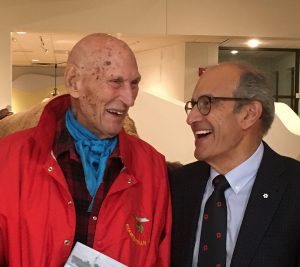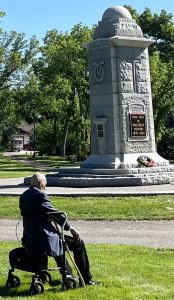
I was told he was coming. John Watson arrived a few minutes before I began a presentation about a major Second World War story, last Wednesday night in Swift Current, Sask. Watson is a tall man. He wore a red jacket, a scarf, and had a twinkle in his eye as we shook hands.
“Thank you for coming, Mr. Watson,” I said. “I understand you’re a veteran, that you served overseas in the last war with the Regina Rifles.”
“Yes, I did,” he said. “But don’t forget the ‘Royal’ part.”
“The Royal Regina Rifles,” I corrected myself, then added, “No doubt ‘Royal’ because of you.”
He laughed and said, “I was just a rifleman.”

Watson’s military regiment goes back to the birth of his home province in 1905, when Saskatchewan entered Confederation. The Regina Rifles have a battle honours list as long as the province is tall, including the Somme, Vimy, Ypres and Passchendaele in the Great War, as well as the Normandy invasion, Falaise Gap, Scheldt Estuary and crossing the Rhine in the Second World War.
It took a bit of coaxing, but I learned that his principal service occurred in Belgium in late 1944, when the Regina Rifles helped secure Antwerp’s docks as a new re-supply port for the final Allied push against Nazi Germany in 1945.
“I was just guarding the docks,” he said.
“Didn’t the Germans bomb Antwerp with V1 and V2 flying bombs?”
“Yeah, but we had to secure those docks for resupply,” he said modestly.
Those who know more about military protocol than I do, tell me that military medals are awarded only when somebody spots a soldier doing something heroic. For the rest, service means fulfilling one’s duty.
And, I guess, that old axiom applies: The measure of a person’s character is what s/he does when nobody’s looking. And I count John Watson’s unheralded service on the docks of Antwerp as heroic and a reflection of his true character.
But such invisible goodness occurs more often than we realize, and in non-military settings too. Not so long ago, I happened to be in a GTA hospital for a planned procedure. During my stay, I was able to enjoy a couple of sit-down meals in the hospital cafeteria.
Remarkably, this one meal happened to include one of my favourites – roasted al dente eggplant. For my palate it was perfectly cooked, and I wanted to tell whoever’d prepared it. When I’d finished my meal, I poked my head into the kitchen. “Who cooked that fabulous eggplant?” I asked.
A young cook looked around, spotted me and said, “I did.”
“Hospital cooking always gets a bad rap. But this was great!”
“Gee thanks,” he said. “Nobody’s ever said that.”
I wanted to go on about the eggplant, but figured he might think I was a bit of a kook suddenly let loose in the hospital. I went away thinking here was a hospital cook slaving away in this huge, almost industrial kitchen, catering to hundreds of patients and staff anonymously, and this guy had taken enough pride in his cooking to deliver, for me, a true delicacy in a hospital cafeteria of all places!

Equally noteworthy, as I mentioned last week, I participated in the 27th annual Saskatchewan Festival of Words. As usual, event organizers staged almost all of the events at the Moose Jaw Museum and Art Gallery.
As I usually do, a couple of hours before I was due to make a presentation, I scouted the room for its audio-visual equipment. I mentioned to the organizers that the room had no projector or sound system. “We’ll take care of it,” someone said.
And when I showed up at the venue, everything was set up and ready to go. After my presentation, I took the time to track down the technician who’d almost magically set up the equipment I needed, just to thank him.
“No worries,” Doug Smith said and he added, “We’re at our best when we’re nearly invisible.”

And I thought of the hospital cook’s eggplant special, and about John Watson, the soldier who did guard duty at the Antwerp docks so the Canadian Army advance over the Rhine could be fully supplied.
There weren’t any citations or medals struck for John Watson’s service in the Royal Regina Rifles during the Second World War. He was just thankful he came home safely to live a full life back in Saskatchewan. He’s now 97.
John Watson’s regiment officially earned the “Royal” designation in 1982, long after he’d served. But I like to think it’s the invisible goodness in men such as he, that earned them such status.